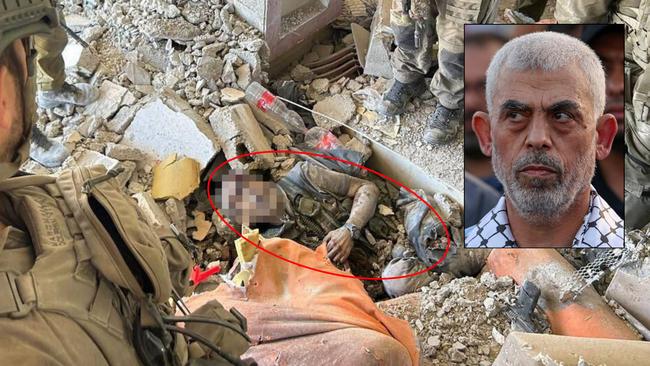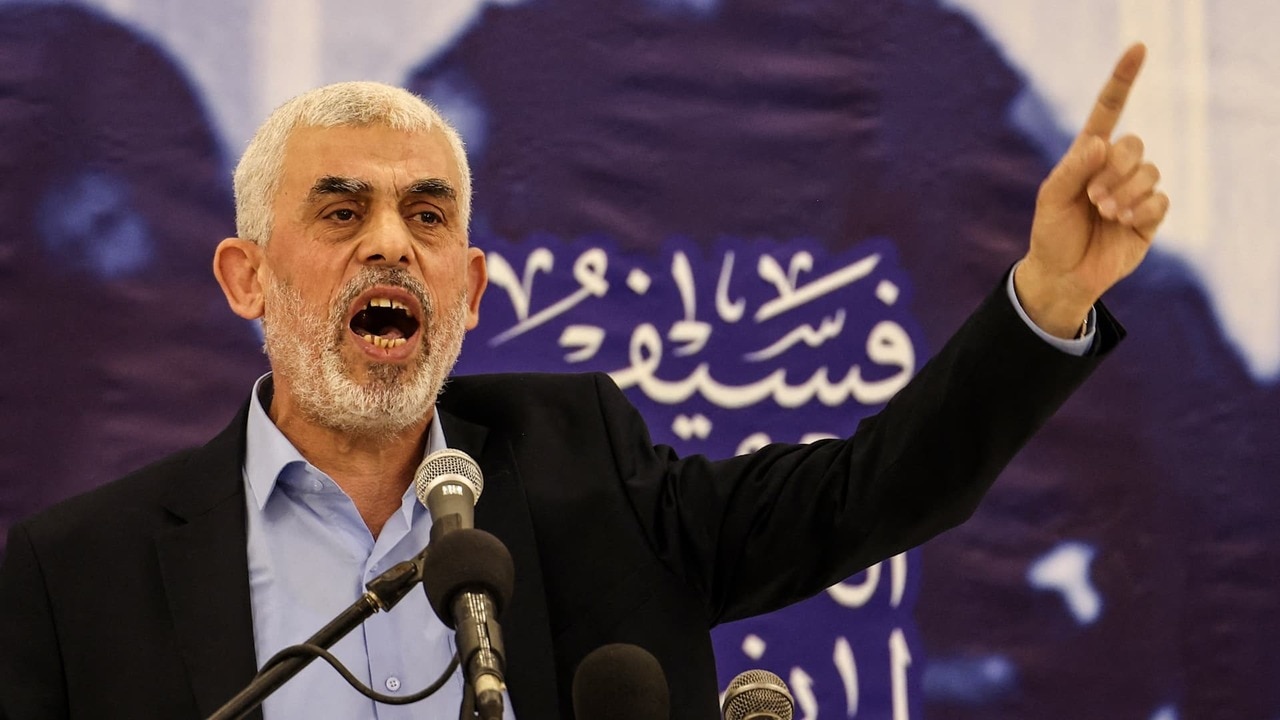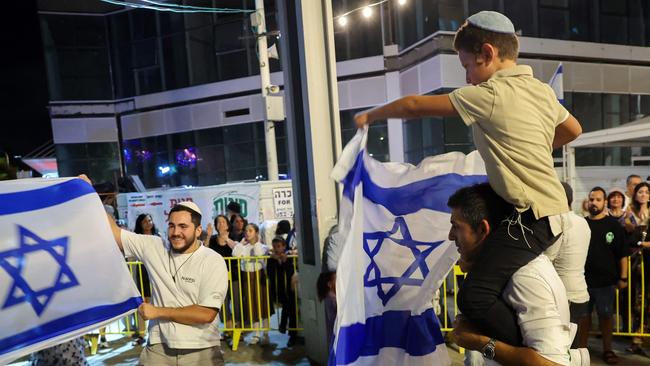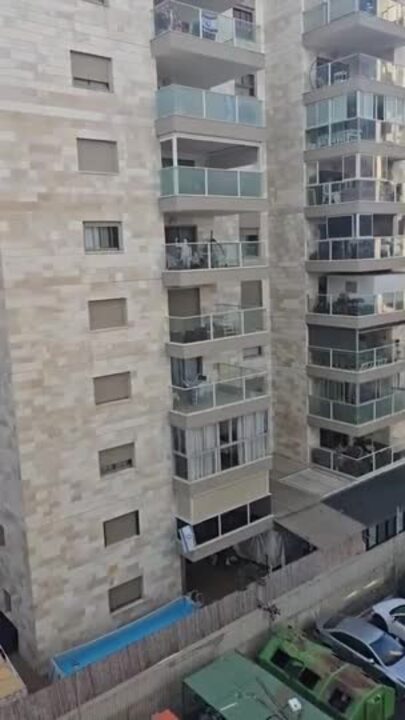Israel confirms Hamas chief Yahya Sinwar is killed in Gaza operation
Israel’s Defence Chief has called on Hamas to surrender after the death of ‘master terrorist’ Yahya Sinwar, the architect of the Oct 7 massacre, in the severest blow yet to the militant group.

Israeli forces killed Hamas leader Yahya Sinwar, the architect of last year’s Oct. 7 attack, officials said Thursday, dealing a major blow to the militant group and achieving one of Israel’s top objectives for the war.
Sinwar, a U.S.-designated terrorist, was killed on Wednesday by Israeli soldiers operating in the southern Gaza Strip. His death was later confirmed via forensic tests, including dental checks, DNA and fingerprint matching, Israeli officials said.
Sinwar was Israel’s most wanted man in Gaza, and his death marks a potential inflection point for the war. It will likely bring pressure from the U.S. and within Israel to end the military offensive there and reach a deal to bring the remaining hostages home. The killing represents a major win for Prime Minister Benjamin Netanyahu, who had vowed to destroy the leadership and military capabilities of Hamas.
“Hamas will no longer rule Gaza,” Netanyahu said Thursday, adding that militants who turn themselves in would be pardoned, while those who harm hostages would be hunted down.
“The war isn’t over,” Netanyahu said.

President Biden said Thursday that he would be speaking with Netanyahu and other Israeli leaders to discuss a pathway for bringing the hostages home to their families and ending the war.
“There is now the opportunity for a ‘day after’ in Gaza without Hamas in power, and for a political settlement that provides a better future for Israelis and Palestinians alike,” said Biden. “Yahya Sinwar was an insurmountable obstacle to achieving all of those goals. That obstacle no longer exists.” Sinwar’s killing leaves Hamas in disarray, with most of its top leaders now dead. In July, Israel killed the group’s military chief, Mohammed Deif, in an airstrike. Later that same month, the group’s political leader, Ismail Haniyeh, was killed in an explosion at a military-run guesthouse in Tehran.
The hunt for Sinwar, who had been Hamas’s top leader in Gaza for years, proved to be the most difficult. For more than a year, he evaded the Israeli military, hiding in tunnels and directing the group’s military operation.
In the end, his killing was determined by a chance encounter with Israeli soldiers rather than a specific operation targeting him, according to former Israeli military officials briefed on the incident.
A tank unit was looking for Hamas tunnels and military sites in the southern Gazan city of Rafah when its soldiers saw militants moving in a building thought to be empty. The tank fired on the building, causing it to collapse and killing Sinwar and two others, these former officials said.
“All this event was a complete coincidence,” said Amir Avivi, a former senior military commander in the Gaza division who was in contact with a former colleague. “Only when they went in and saw him did they say it looked like Sinwar,” he said.
Hamas didn’t respond to a request for comment.

Sinwar, who has been Hamas’s top leader in Gaza for years, took control of the group’s political bureau in August after Israel killed the previous leader, Haniyeh.
Sinwar was widely viewed as the architect of the Oct. 7, 2023, attacks that killed 1,200 people in southern Israel and led to the kidnapping of around 250 others.
Around 100 hostages remain in captivity in Gaza, including many dead. Talks between Israel and Hamas to secure the release of the remaining hostages have collapsed in recent months, largely because of the intransigence of Sinwar and Netanyahu.
The Israeli military said there was no presence of hostages in the area of operations in Gaza where Sinwar was killed. Israeli officials had previously said they believed Sinwar surrounded himself with hostages as a security measure.
The conflict sparked by the Oct. 7 attacks has killed more than 42,000 people in Gaza, most of them civilians, according to Palestinian health authorities. The figures don’t tally the number of combatants killed.
During the war, Israel has also killed the head of Hamas’s armed wing, Deif; his deputy Marwan Issa; and a string of lower-level commanders.
Earlier this month, the Israeli military also said it killed Rawhi Mushtaha, another senior Hamas political official and one of a few people considered closest to Sinwar. The two set up Hamas’s internal police force in the 1980s, spent time in prison together and were both released in a prisoner swap in 2011.
For years, Hamas had been split between hard-liners such as Sinwar, who viewed the deaths of civilians as necessary to destabilize Israel, and militants who countenanced violence but wanted the group to preserve some political legitimacy as a route to achieving its aims of a Palestinian state.
After Sinwar became leader in August, he began imposing a more violent vision of Hamas on the group, The Wall Street Journal reported.
Top Biden administration officials immediately scrambled to confirm the initial reports that Sinwar had been killed, with top White House aides contacting their Israeli counterparts to see if there were any developments. The U.S., which has already called on Israel to wind down operations in Gaza, may use this moment to further pressure its ally to end the fighting.
As the news broke, Biden was making his way to Germany to meet with European counterparts to discuss the war in Ukraine. Top Pentagon officials and commanders learned about Sinwar’s death as aides interrupted their morning meetings and shared news reports of the strike, defense officials said.

Sinwar began actively planning an attack in 2021, negotiating with Iran over funding for a large-scale assault that the Hamas leader said would lead to Israel’s destruction within two years, according to documents the Israeli military said they retrieved from Gaza and shared this month with the Journal.
The brutality of the attacks on Oct. 7 of last year and the atrocities committed by Hamas and other Palestinian groups shocked the international community, causing even some members of Hamas to criticize Sinwar.
Alongside Hamas’s military leaders, Israel also has since killed Haniyeh, the former head of its political leadership, and his deputy, Saleh al-Arouri, who died in an Israeli airstrike on a building in Beirut in January.
Sinwar could be succeeded by his deputy in Gaza, Khalil al-Hayya, who has represented Hamas in cease-fire negotiations with Israel, or by former Hamas leader, Khaled Meshaal. Sinwar’s ascension to leader of Hamas in August cemented the group’s ties with Iran and his death could signal another shift in strategy.
Over the course of a year, Israel’s military has systematically moved from north to south along the Gaza Strip, dismantling Hamas’s armed wing, Izz ad-Din al-Qassam Brigades. Even so, the Israeli military has struggled to completely eliminate Hamas from Gaza, at times returning to parts of the strip to engage in fighting.
Israel’s military says it has killed more than 15,000 Hamas militants in the past year of fighting. Intelligence officials from Arab countries say Hamas’s losses, while severe, are closer to 10,000. The group had an armed force of around 25,000 to 30,000 fighters before the war.
As Israel has taken out Hamas’s military capabilities, its military has shifted in recent weeks to focus on an air-and-ground operation against Hezbollah in Lebanon. The Lebanese military group began firing rockets and missiles on Israel a day after Hamas sparked the war in Gaza, causing the displacement of tens of thousands of people on both sides of the Israeli-Lebanese border.

Israel’s campaign has killed Hezbollah’s leader and other officials, as well as a senior Iranian military commander. In response, Iran launched a ballistic-missile assault earlier this month on Israeli territory and Israel is expected to mount an attack against Iran in retaliation.
It isn’t clear whether Sinwar’s death will change Israel’s thinking about an attack on Iran.
Given Israel has killed much of Hamas’s military and political leadership, Netanyahu is likely to face pressure to re-engage in cease-fire talks in Gaza that could now lead to the return of hostages held there.
A forum representing the families of hostages held in Gaza said Thursday that it is worried about the fate of the remaining hostages and that it demands “to leverage the military achievement for an immediate deal for their return.”
The Wall Street Journal



To join the conversation, please log in. Don't have an account? Register
Join the conversation, you are commenting as Logout